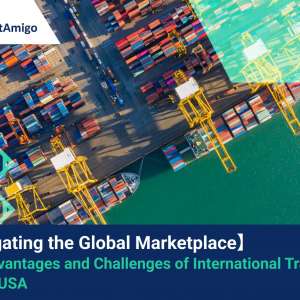Author Name: Tiffany Lee – Marketing Analyst at FreightAmigo
Blockchain technology has emerged as a powerful driver of change in various fields, including logistics. At its core, it is a digital ledger technology that offers a secure and transparent way of recording and sharing data across a network of computers. This article delves into the potential of blockchain technology for revolutionizing logistics and supply chain management operations.
Want To Compare The Best Express, Air Freight, Sea Freight, Rail Freight & Trucking Rates So As To Have Better Control On Cost?
Understanding Blockchain Technology in Logistics
Blockchain technology is essentially a distributed ledger technology that allows for the secure and transparent recording of data across a network of computers. In the context of logistics, it has the potential to significantly boost supply chain efficiency, transparency, and security.
Blockchain: The Core Concept
A blockchain is essentially a chain of blocks, each containing unique data. Every block in the chain holds a unique cryptographic hash, which acts as a digital fingerprint for the data it contains. The hash of each block is linked to the hash of the preceding block, forming a chain that is difficult to alter once recorded on the network.
The decentralized nature of blockchain means there is no central authority or single point of control. Instead, every node in the network maintains a copy of the ledger, and all nodes must agree on the ledger’s contents for a transaction to be validated and recorded.
Blockchain in Logistics: The Potential
In the logistics sector, blockchain technology can be employed to enhance supply chain visibility, traceability, and efficiency. For instance, the movement of goods can be recorded on a blockchain, giving all supply chain participants real-time visibility into the location and status of the goods. This can reduce the risk of fraud, theft, or mismanagement, and also help optimize the supply chain by identifying inefficiencies and bottlenecks.
The Benefits of Blockchain in Logistics
The application of blockchain technology in logistics presents several advantages that can transform the operations of supply chains. These benefits make blockchain an attractive proposition for the logistics industry.
Improved Supply Chain Visibility
Blockchain technology offers greater transparency and traceability throughout the supply chain. All participants can access and verify data in real-time, ensuring everyone has the same information. This reduces errors, delays, and disputes, while enabling businesses to quickly respond to unexpected events. By enhancing supply chain visibility, blockchain can help businesses optimize their operations and boost overall supply chain performance.
Enhanced Security
With its highly secure and tamper-proof way of storing data, blockchain ensures that each block in the chain is cryptographically linked to the previous block, making it nearly impossible to alter or delete any data without detection. This makes it easier to prevent fraud, theft, and other types of cybercrime, which can have significant financial and reputational implications for businesses.
Cost Reduction
Blockchain can help cut costs in the logistics industry by eliminating intermediaries and automating processes. With a shared ledger, businesses can avoid costly reconciliation processes and reduce the need for manual paperwork. This can lead to faster transactions and fewer errors, resulting in cost savings for all participants.
Increased Efficiency
By streamlining processes and improving transparency, blockchain can help boost efficiency in the logistics industry. For example, businesses can use blockchain technology to automate the tracking and verification of shipments, reducing the time and resources required for manual tracking and reconciliation. This can lead to faster delivery, reduced lead times, and improved customer satisfaction.
Blockchain Use Cases in Logistics
There are several key use cases for blockchain technology in logistics that are helping companies in their efforts to increase speed, improve traceability, and reduce costs.
Accenture
Accenture collaborates with companies like Mastercard and Amazon Web Services to execute its circular supply chain program. With blockchain technology, businesses can verify identities, facilitate quicker payments, and trace transactions along supply chains. This has enabled logistics organizations to deliver more consistent and uninterrupted service.
Slync.io
Slync.io combines blockchain and AI to provide retailers, manufacturers, and suppliers with real-time insights into all of their local and global shipments. The platform allows shippers to automate monotonous workflows, predict bottlenecks or challenges in a logistics process, and even get a real-time overview of shipment activity.
Chronicled
Chronicled combines blockchain with AI and IoT devices to automate traceability and instantaneously approve financial transactions in the shipping industry. Logistics companies can gain better insights into environmental conditions and transfer-of-custody processes using Chronicled’s blockchain-enabled IoT devices. This allows businesses to securely and efficiently move their products worldwide.
Koopman Logistics
Koopman Logistics is an automotive transportation company that uses blockchain to ship cars worldwide. By employing ledger technology, Koopman reduces paper supply, speeds up the payment process, and makes the shipping process more secure. In April 2018, Koopman became the world’s first automotive logistics company to deliver a vehicle via a completely paperless blockchain process.
Microsoft
Microsoft’s cloud platform Azure simplifies logistics tasks with blockchain technology. Azure’s blockchain features can track items along supply chains, which helps groups like pharmaceutical and perishable food companies follow compliance standards. The platform also builds decentralized networks between financial institutions, facilitating faster transactions.
Future of Blockchain in Logistics
The future of blockchain in logistics is promising, with more companies beginning to recognize the benefits and potential of this technology. Here are some potential developments and impacts that blockchain could have on the logistics industry:
1.Increased Adoption
As more companies become aware of the benefits of blockchain technology, we can expect to see increased adoption of blockchain in logistics. This could lead to a more standardized and interconnected logistics ecosystem.
2.Enhanced Collaboration
Blockchain can enable different parties in the supply chain to collaborate and share data in real time without intermediaries. This could lead to more efficient and transparent logistics processes.
3.Improved Traceability
Blockchain’s distributed ledger can provide end-to-end traceability of products in the supply chain, making it easier to track goods from the point of origin to the final destination. This can help reduce the risk of fraud and increase trust in the supply chain.
4.Greater Efficiency
Blockchain can automate many logistics processes, such as smart contracts, payment and settlement, and tracking of assets in real time. This could lead to increased efficiency and reduced costs.
5.Development of New Business Models
Blockchain’s ability to facilitate decentralized marketplaces and enable secure and transparent peer-to-peer transactions can open up new opportunities for businesses to develop innovative logistics solutions.
Conclusion
In conclusion, blockchain technology is a game-changer for the logistics industry, providing a secure, transparent, and efficient way of recording, storing, and sharing data across a network of computers. The benefits of using blockchain technology in logistics are wide-ranging, offering improved supply chain visibility, enhanced security, reduced costs, and increased efficiency.
With these advantages, blockchain technology has the potential to revolutionize the way supply chains operate and improve business performance. As we look to the future, it’s clear that blockchain technology will continue to play a critical role in the logistics industry, and those who embrace it are likely to be at a significant advantage in a highly competitive marketplace.
There Are Different Options For Cargo Transportation. If You Want To Choose The Most Convenient And Suitable Solution, It Is Best To Have The Full Support Of Logistics Experts! If You Are Planning To Ship Goods Overseas, Please Go To The FreightAmigo Page For Inquiries.
===
Read More:
【Export of USA】 A Gateway to Success and Global Economic Influence
The Key Trade Partners of the USA: Boosting International Commerce
【Export of USA】 US-China Trade War’s Influence on USA’s Export Industry
===
If you have any inquiries on logistics/supply chain, feel free to contact FreightAmigo now:
Chat with us online OR
Phone : +852 28121686
WhatsApp: +852 27467829



